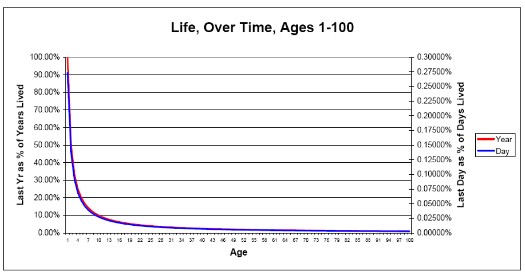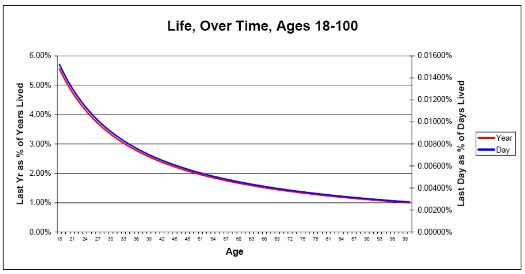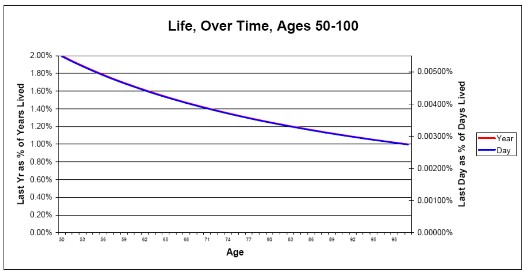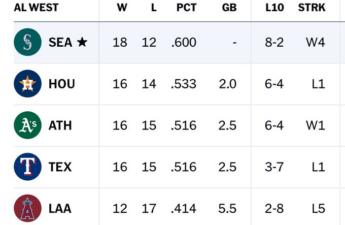Despite how it may sound, this post is not about the stock market. At least, not directly.
People often wonder why it seems like life is speeding up as they go, why it seems that an hour just doesn’t mean what it used to, let alone a day or a year. People attribute this perception to irrationality, to craziness, to an overarching sense that time is careening toward some flat-line horizon of horror in the not-too-distance.
What people don’t often realize is that this perception is real. And completely rational. It is a logical, graphable function of the nature of existence on a temporal plane.
Nearly four years ago, I compiled a compact disc to serve as Emily’s and my New Year’s letter for the annum. While I’m a big fan of New Year’s letters conceptually, Emily and I have sort of run aground in an ongoing conflict over the nature, tenor, and sourcing of these letters, and thus have released only two in seven years of cohabitation, at New Year’s 2003 (letter) and 2005 (CD).
2005’s aptly named Welcome 2005! was mostly other people’s songs, but it did include two readings of other people’s writings and two readings of my own original work, primarily written for the CD itself. One was a sort of fiction/parable that was as much a vehicle for its closing punchline as anything else, called “The Legend of Jill and Will”. The more serious piece was an essayish thing called “The Shortest Year”, wherein I outlined much of my theory about the logic behind each person’s sense that time is literally getting shorter. With begging of forgiveness from those who received this CD (hey, it’s been four years, you might’ve forgotten), I reprint the text here:
The Shortest Year
In contemplating another year’s conclusion, it seems only obvious that it has passed too quickly. Too recently were we contemplating the same changing of numbers, the same lighting of lights, the same long nights. And short days.
Indeed, the shortest day of each year – a strange reference to a timeframe that lasts 24 hours just as any other day – falls in late December each year. Though winter always seems to be closing in through the year’s early months, the days are actually on their march back towards springtime equilibrium. Just before Christmas, in sight of New Year’s, night wraps its dark fingers tightest around the receding daylight.
Yet in examining the shortest day, it seems to find itself a parallel in the year just ending. Was not this year the shortest on record? Can we not seem to feel the pulse of time speeding, hurtling us ever closer to years that seem more science fiction than contemporary? Whatever happened to the endless waiting of childhood, when next Christmas, birthday, or even schoolday seemed impossibly distant?
It may be of some comfort to understand that there is a statistical basis for this rug-pulled-out-from-under-us feeling that each winter brings. Each year that passes, though 365 days in length like the 24 hours of the shortest day, is less time in one’s life than the year prior. While your third year of life was a full 33% of existence to that point, the fourth was only 25%, and the 10th just 10%. Finishing a year that struggled to be more than 4% of my life is indeed daunting. The knowledge that the percentage will only shrink from here speaks like an urgent call to action in my soul. Time is running out!
While it may seem trivial that the first year of life was, at the time, all there was to life, can we really imagine how much we learned in that year? More and more it seems clear how childhood has greater presence and impact on an adult’s perspective than all the subsequent years put together. While highly significant events can increase any given year’s impact beyond its percentage at the time, time still seems to pass faster with every passing day.
And as I am about to launch into a call to haste, if not near-panic, I am reminded of what seems to be perhaps the most valuable lesson of this, the shortest year. Patience, the ability to wait without concern or a sense of urgency, is among the most vital and under-rated skills one can develop. Whether one is trying to increase a stack of chips at the poker table, trap a king of the opposite color, encourage a governor to sign a piece of paper, or convince a child not to throw a fist, patience is essential. In American society especially, patience seems the lost art of those who somehow replace stress with serenity. Doctors and dentists especially are lost without patients!
Thus we face the importance of patience in a life of ever-shortening years. It is likely unsurprising that such schizophrenic conclusions emerge from reflecting on the shortest year. How else but with paradox can we account for the lunacy of these times? This country, mired in a highly unpopular war, offers only candidates who promise to extend and perpetuate that war. This world, able to produce sufficient food to feed its human hordes, still starves millions with its inability to properly distribute such food. This era, filled with tremendous technology and wealth, still finds cruelty and misunderstanding in almost every corner of the swiftly-shrinking planet. And even at home, I struggle with the knowledge of how much needs to be changed and the utterly overwhelming odds against any such change occurring, let alone with my having a hand in it.
My friends, it is a very difficult time to have hope, to have joy, to have happy holidays.
Which brings us back to patience. The serenity to ride things out, to wait for better, to know that the days will again lengthen and the light will return. It is something akin to faith, to resigning oneself to possibility rather than insisting on dread. It is not easy to do in the shortest year, but it appears to verge on necessary.
And how else but with an eye to the waning percentages of the shortest year can we resolve ourselves to address the problems still plaguing us? We must be spurred on by the ever-shortening years, understanding that the horizon always draws near and only we decide whether the road to the horizon is one of potential or peril. A resolution to our paradox may be found in making haste to act in these shortest years while somehow having patience in seeing results from such actions. Indeed, we may be better off waiting for Godot than for such results. But does such futility diminish the need for action in the shortest year?
Songs and stories will follow this open letter. Not all are merry and bright, but then not all Christmases are white. In the time of respite between the shortest day and the newest, even shorter year, we have time to hope. To resolve. To reflect, as the snow reflects the light of both sun and moon. Dear friends, make patient haste. May we all take joy in the thoughts, deeds, and yes holidays of peace. Actual results may vary.
What I didn’t do in 2005 after developing this theory, and what occurred to me to do this morning in the shower, while contemplating meetings I needed to prepare for with graphs at work (the meetings were subsequently cancelled upon my arrival at work, a growing theme lately), was actually graph the rate of diminishment of marginal temporal returns.
In other words, by plotting the percentage of each year (or even day) of one’s life in terms of its percentage of the overall amount of life one had lived thus far, one could visually see how much longer units of time would seem to someone in the early years vs. the late. And this staggering graphic representation would illustrate exactly the magnitude of apparent speeding up that life undertook in any given year (or day).
To wit:

Look at that. It’s breathtaking, isn’t it? If you ever wonder why people are obsessed with early childhood development and its impact on the trajectory of one’s life, or even why psychology seems deeply rooted in understanding childhood influences, wonder no more. It’s no wonder. Look at that graph. Childhood really does impact life by an insanely disproportionate rate. Time in the first year of life is five times as significant seeming than in the fifth year of life and twenty times the twentieth. Even the fifth year is four times the twentieth.
Practically, this means that a season at age twenty will feel like a month did at age five. A year at age sixty will feel like that same season at twenty or that same month at five.
But this graph makes it look like things really slow down at around age twenty and just trail off indefinitely, with little difference between the years. This graph does a great job of illustrating the unexaggerable significance of the first ten years or so of life, but one could reasonably glance at this and assume the rate of speeding up one feels thereafter is not so notable.
Au contraire:

Here we see that while the rate of sheer maddening speeding that happens over the course of childhood is diminished, adulthood nevertheless speeds up over time at a notable clip, especially early adulthood. A year at age 100 is roughly equivalent to two months at age 18. A year at age 50 is roughly a season at age 18. This is still significant speeding… most of my audience is approaching 30 and would do well to consider that the twenty-four hour day you just had will feel like eight hours if you’re lucky enough to reach age 90.
Puts a new spin on living longer, doesn’t it? Makes one wonder why the drive is to extend life without being nearly as mindful as the quality of that life. Can one really say that living to 120 is such a joy when each of those years past one-hundred feels like a month did in mid-childhood?
The line does flatten a bit toward the end, by the way… the difference between time at 50 and 100 is significant, but the difference between, say, one’s sixties and eighties is not all that notable:

So that’s a mixed blessing of later life – while time is constantly speeding up, the rate at which it speeds is constantly slowing, such that time will all feel about the same very late in a long life (though still a veritable blink compared to childhood or even mid-life). Is it thus any wonder that people have a harder time remembering such relative insignificances as the last few days at the end of such a life, yet very few old folks seem to have trouble with long-term memory? The immediate past may seem more relevant to a younger outsider whose years are still around 2-3% of their life at that point, but to those filing away days that are less than one-two-hundredth of a percent of their life, how important are such days? Especially when contrasted with shining days that were a whole twenty-fifth of a percent?
And yet of course, it must be observed that this is all a study in perception, not actual time itself. It can be well debated how much time is a construct for a perception or a legitimate objective reality, but let’s leave that on the side for now. The fact is that a second (probably) lasts for exactly one second, be it a moment after your birth or a moment before your death of old age. Time is time. One can take control of this day just as much as a day years ago and it will have just as much opportunity for productivity, use, and benefit to the future.
But it won’t feel like it, mentally. Because one is not an amnesiac, is not discovering life for the first time, one will feel this day as a point against so many days that have come before, the collective memory of a life piled up to get to this moment. And it’s that weight of history and memory that came before that squeezes this little day into feeling like the shortest yet, and all to come will infinitely follow the same mold.
The trick, then, to getting the most out of life seems to be twofold:
First, one must do everything possible to maximize the impact and use of the early years. This is very challenging, especially in modern America where everyone has been taught from birth to invest in the future, defer things till later, put off everything fun or expensive till retirement. This reality may seem in stark contrast to the realities of debt and short-term gratification standards that American life has really manifest into, but nevertheless people train themselves to always wait till later to really make the most out of their meaning in life. The extensive and extending amount of minimum education that America requires of its children to get by is an excellent example of this ever-onward march toward investing now to reap later. Combating this trend may be the best possible way to make one’s life more significant. This does not necessarily mean dropping out of school, of course, but engaging in life during those times with the seriousness that its relative weight in one’s ultimate memory connotes. This really is in stark contrast to how most people in their teens and twenties live their life. As a serious person at that age, I remember just how weirdly alone I felt in being so.
Second, one must do everything possible to counteract the perception of speeding up that life has. One could make a decently strong case for forgetting everything one has done prior to any given day. This could indeed create a sort of infantile rebirth of one’s perspective and lead to some really fruitful midlife years. However, the expense of losing the lessons learned and the improved ease of navigating life that comes with age seems too prohibitive to make this the ideal solution. A better solution seems to be about taking steps to slow down one’s perception of life in any given moment. People have made bazillions of dollars writing books and crafting self-help videos and seminars to this very purpose, but I think mostly without the context that the theories and graphs above provide. And not wanting to jump into the self-help market myself, I can only offer you this kind of writing in this context: find a way to really appreciate each hour and to make sure you’re doing the most with it. Remember how long a day felt when you were in first grade and try to recapture that slowness, that extensive volatility over the course of one whole day.
The biggest impediment to this second course of action, of course, is that most adults have constructed lives that are 90%+ filled with things that one wants to get over with as fast as possible. Indeed, living a day at work that seems as long as a first grade day used to seems downright terrifying. Most of us give thanks that days at work go way faster than days in grade school, that even boring and dull days now can’t compete with the interminability that was a hallmark of such days decades earlier.
So the solution must be not only extending the days’ apparent length of time but… watch out now… filling the days with things worth remembering and taking one’s time on. There’s the rub, no?
And while that may sound like a pipedream, the luxury only of the very wealthy or those who forewent education and thus are not saddled with debt (and, you note, may be dead of starvation in a year or two), this period of history may be your grand opportunity, your time of great hope to cast aside the trappings of an ever-shortening life filled with lame drudgery. Because, of course, you may soon lose your job. Lots of us, everywhere, may be about to have one thing in a larger quantity than we ever expected: time.
And while those who wish to eat may (we don’t know for sure – things may be economically too dire and hopeless) have to spend at least part of that extra time hunting around for another source of interminable drudgery (i.e. a job), we may end up capitulating and finding free sources of sustenance and shelter and just all being in the same boat with a whole bunch of suddenly re-lengthened time.
This looks a lot like some terrifying monolith to most folks, but it makes me giddy with excitement. If we have all that extra time to think again, to play, to contemplate the future, it’ll be just like being a kid again. But with less awkwardness and angst, plus more knowledge and understanding. To me, that sounds like the greatest opportunity America’s had in a long old time.
So maybe, folks, instead of clinging to that almost-chopped job with all your might and last tendrils, it’s time to just let go. To release, be free, rediscover the childhood you weren’t paying sufficient attention during in the first place. Let yourself be. Be. Take your time. Literally.
I guess this post was about the stock market after all.


